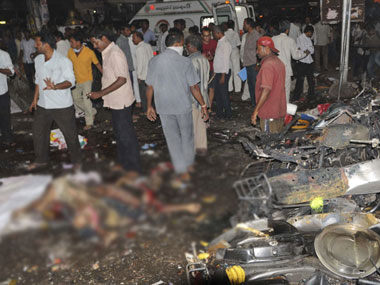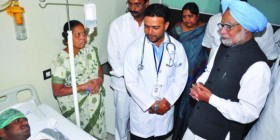“Come near Chandrayangutta bridge. Thoda baata karne ka hai (We need to talk to you),” ordered the voice in Hyderabadi Urdu on Sunday morning
The man who identified himself as an officer from Hyderabad police’s East Zone was in fact calling Dr Ibrahim Ali Junaid from Mohammed Rayeesuddin’s phone. Rayeesuddin had been called for questioning and the police wanted to quiz Junaid as well. When Junaid told the officer he was caught up with some other work, the cop said he would call again on Monday.
For 30-year-old Junaid, this call that he had been expecting ever since the Dilsukhnagar twin blasts on Thursday evening, was like de-ja-vu. Rayees and Junaid had met in similar circumstances in 2007 some three days after the blasts at Mecca Masjid on 18 May. The two were called for questioning, illegally detained, badly tortured and reportedly told to confess their guilt, before being formally arrested in September that year. Interestingly, the charge against them was not specific to plotting the bomb blast at Mecca Masjid that killed nine people but waging war against the state. The two spent five months in Hyderabad’s Cherlapalli prison and Junaid was also subjected to a narco test.
Over one hundred youth were questioned and even the case against the 26 youth against whom similar cases were booked, collapsed like a pack of cards once the CBI probe pointed to a rightwing group’s hand in the blast. Everyone was subsequently exonerated and the government was ordered to pay three lakh rupees in compensation to many of them in December 2011.
Junaid, an Unani medicine physician, flashes the letter signed by the Hyderabad commissioner of police that was given to all the acquitted youth, like a certificate of good conduct. It said Junaid had no hand in the Mecca Masjid bomb blast case. Yet, he says, being called again means the clock is being turned back.
In the past 24 hours, apart from Rayeesuddin, at least five other youth who were picked up after May 2007, have been taken by the police for questioning. The difference between 2007 and 2013 however is that the community is standing up, drawing attention to earlier misadventures of the investigating agencies. The psyche has changed. There is an unwillingness to accept someone is in a grey zone just because the police says so. The rhetoric of the radical right that says “all Muslims are not terrorists but all terrorists seem to be Muslims” is being questioned aggressively. Both in the real world and online in the world of Twitter and Facebook.
Lawyer L Ravichander who was appointed by the Andhra Pradesh Minorities Commission as a one-man fact-finding committee to speak to and examine over 20 youth arrested after the Mecca Masjid blast, finds it troublesome that the cops have instinctively gone back to the same youth. “No one is saying the police should not carry out its investigation. But the fact that they immediately suspect not anyone else but the same set of people is a reflection of their mindset. Such actions put a question mark over the secular credentials of the police,” he says.
Civil liberties activist Lateef Mohammed Khan blames some of the media for pushing the police to show results by way of arrests. “The media is putting pressure on the police and the Muslim youth in Hyderabad will become soft targets like in 2007. If the same thing repeats, the media will be responsible,” he warns. Lateef says the Special Investigation Team (SIT) of the Hyderabad police cannot be trusted to carry out a fair investigation and wants the NIA to be entrusted with the job.
Community leaders point to a report titled “What it means to be a Muslim in India today” prepared by the People’s Tribunal on the “Atrocities Committed Against the Minorities In The Name of Fighting Terrorism” in August 2008. It noted : “This victimisation and demonisation of Muslims in the guise of investigation of terror offences is leading to a very strong sense of insecurity and alienation, which may lead to frightful consequences for the nation.”
Even Amnesty International has told the police what is expected of it. “The authorities must conduct a thorough and impartial investigation into the attacks. In doing so, they must protect minority communities from the discrimination, violence and harassment they often suffer in the aftermath of an attack,” it said.
This is exactly what many senior IPS officers call a “sustained anti-police campaign by civil groups, media, minority groups and part of the political establishment”. They point out that the police has the right to question anyone, and no one, belonging to either community or organisation has any business to dictate who should be and who should not be questioned.
Indeed, if the police is going to be asked to investigate with its hands tied, it will only be groping in the dark. The police admittedly made a mistake in 2007 but based on that, if community leaders are going to punch holes in the already tattered image of the police, the functioning of the force will only suffer more.
So while many in the Muslim community complain “bekaar me hi bachchon ko utha liya” (our boys were taken away without reason), there are cops who feels it is a typical minority syndrome. A senior officer in the state intelligence department says, “There is a tendency to be overprotective, never to admit a wrong. That can be dangerous.”
No, we will not go down that road at all,” says Anurag Sharma, Hyderabad’s police commissioner when asked if the same youth who were acquitted after Mecca Masjid are being treated as suspects now. But there is no denying that there is tremendous pressure on the police to crack the case fast. It believes the terror plot was devised outside Andhra Pradesh but does not rule out the involvement of local help in providing logistical support. And the process to identify and unmask those Hyderabadi black sheep has begun in right earnest.
The men in uniform in Hyderabad police are on test and it is for them to demonstrate that they are professional and an impartial unit.




Leave a reply